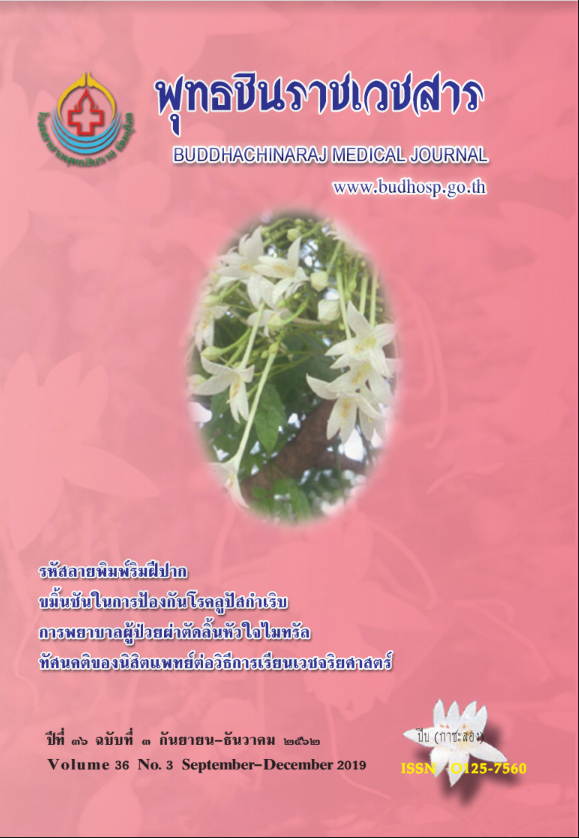การเป็นองค์กรแห่งการเรียนรู้ของหน่วยบริการปฐมภูมิ ตามแนวคิดทฤษฎีคอนสตรัคติวิสต์
การเป็นองค์กรแห่งการเรียนรู้ของหน่วยบริการปฐมภูมิ
คำสำคัญ:
หน่วยบริการปฐมภูมิ, องค์กรแห่งการเรียนรู้, แนวคิดทฤษฎีคอนสตรัคติวิสต์บทคัดย่อ
แนวคิดองค์กรแห่งการเรียนรู้ถูกนำมาใช้ในการดำเนินการหน่วยบริการปฐมภูมิเพื่อให้เกิดกระบวนการทำงานร่วมกัน การที่บุคลากรได้ลงมือปฏิบัติจริง ทบทวนความรู้ที่มีในตนเองจนค้นพบความรู้ที่เหมาะสมในการให้บริการตามบริบทจึงมีความสำคัญ การวิจัยแบบผสมผสานเชิงปริมาณและคุณภาพนี้มีวัตถุประสงค์เพื่อศึกษาความเป็นองค์กรแห่งการเรียนรู้ของหน่วยบริการปฐมภูมิตามแนวคิดทฤษฎีคอนสตรัคติวิสต์ เก็บข้อมูลด้วยแบบสอบถามเกี่ยวกับมิติความเป็นองค์กรแห่งการเรียนรู้ในบุคลากรสาธารณสุขในจังหวัดลำพูน 54 คนที่เข้าร่วมโครงการองค์กรแห่งการเรียนรู้ของเครือข่ายบริการปฐมภูมิจังหวัดลำพูนปีงบประมาณ 2561 และการสัมภาษณ์ตัวแทนที่เกี่ยวข้องกับโครงการ 6 คนด้วยแบบสัมภาษณ์เชิงลึกกึ่งโครงสร้าง ดำเนินการระหว่างเดือนกรกฎาคม พ.ศ. 2561 ถึงเดือนพฤษภาคม พ.ศ. 2562 นำเสนอข้อมูลเป็นค่าความถี่ ค่าร้อยละ ค่าเฉลี่ย และค่าเบี่ยงเบนมาตรฐาน เปรียบเทียบข้อมูลก่อนและหลังเข้าร่วมโครงการฯ ด้วยการทดสอบ paired t กำนดระดับนัยสำคัญทางสถิติที่ 0.5 ส่วนข้อมูลจากการสัมภาษณ์ใช้การวิเคราะห์เนื้อหาแบบสามเส้า ผลการศึกษาพบคะแนนมิติความเป็นองค์กรแห่งการเรียนรู้เพิ่มขึ้นอย่างมีนัยสำคัญทางสถิติทุกมิติ (ยกเว้นมิติที่ 3) โดยมิติที่ 5 เรื่องการให้อำนาจแต่ละบุคคลที่สอดคล้องกับวิสัยทัศน์ขององค์กรมีคะแนนเฉลี่ยเพิ่มขึ้นมากที่สุด (2.43 คะแนน, p = 0.01) สรุปได้ว่ากิจกรรมที่ส่งผลการเรียนรู้ตามแนวคิดทฤษฎีคอนสตรัคติวิสต์ ได้แก่ การแลกเปลี่ยนการเรียนรู้ประสบการณ์ทั้งด้านบวกและด้านลบของผู้เข้าร่วมโครงการ การยอมรับฟังมุมมองที่แตกต่าง การใช้เรื่องเล่าประสบการณ์ที่มีคุณค่า และการทำกิจกรรมกลุ่มทำให้บรรลุภารกิจตามเป้าหมายที่ได้วางไว้ร่วมกัน
เอกสารอ้างอิง
2. United Nations. Thailand's Voluntary National Review on the implement of the 2030 Agenda for Sustainable Development [internet]. 2017 [cited 2019 Feb 7]. Available from: https://sustainable development [internet]. un.org/content/documents/16147Thailand.pdf
3. United Nations. The sustainable development goals report [internet]. 2016 [cited 2019 Feb 7]. Available from: http://www.un.org.lb/Library/Assets/The-Sustainable-Development-Goals-Report-2016-Global.pdf
4. IAEG-SDGs. Final list of proposed sustainable development goal indicators:Inter-agency and expert group on sustainable development goal [internet]. 2016 [cited 2019 Feb 17]. Available from:https://data.opendevelopmentmekong.net/
dataset/93b6c8bc-8f80-4b61-846c-0bfa4850355d/resource/f4efbd58-3977-46a-a6c0-7b2fbb7df831/download/11803officiallist-of-proposed-sdg-indicators.pdf
5. Kruk ME, Gage AD, Joseph NT, Danaei G, Garcia-Saiso S, Salomon JA. Mortality due to low-quality health systems in the universal health coverage era: A systematic analysis of amenable deaths in 137 countries. Lancet 2018;392(10160):2203-12.
6. Boonjian P. The development of a network of primary care services. J Prev Med Assoc Thai 2016;6(1):38-48.
7. Khan MS, Hashmani FN. Political and technical barriers to improving quality of health care. Lancet 2018;392(10160):2146-7.
8. Srivanichakorn S. Primary care service development situation. Nonthaburi: Sahamitr Printing & Publishing Co, Ltd;2015.
9. Srisomya P, Awiphan R, Sakarinkhul P. Quality development process and learning organization assessment of Amphoe Mueang Lamphun Primary Care Network. Res Development Health Syst J 2018;11(3):43-52.
10. Gelmon S, Bouranis N, Sandberg B, Petchel S. Strategies for addressing the challenges of patient-centered medical home implementation: Lessons from Oregon. J Am Board Fam Med 2018;31(3):334-41.
11. Mertens F, de Groot E, Meijer L, Wens J, Gemma Cherry M, Deveugele M, et al. Workplace learning through collaboration in primary healthcare: A BEME realist review of what works, for whom and in what circumstances: BEME Guide No. 46. Med
Teach 2018;40(2):117-34.
12. Burgess A, Roberts C, Ayton T, Mellis C. Implementation of modified team-based learning within a problem based learning medical curriculum: a focus groupstudy. BMC Med Educ 2018;18(1):74.
13. Olusegun B, Olusegun S. Constructivism learning theory: A paradigm for teaching and Learning. IOSR J Res Method Educ 2015;5(6):66-70.
14. Ngamvichaikit A. Mixed methods approach:Qualitative and quantitative research design. Modern Management Sci J 2015;13(1):1-12.
15. Marsick VJ, Watkins KE. Demonstrating the value of an organization's learning culture: The dimensions of the learning organization questionnaire. Adv Dev Hum Resour 2003;5(2):132-51.
16. Thomas A, Menon A, Boruff J, Rodriguez AM, Ahmed S. Applications of social constructivist learning theories in knowledge translation for healthcare professionals: a scoping review. Implement Sci 2014;9:54.
17. Pornwisetsirikun S, Srisomya P, Sakarinkhul P. Learning organization and sub-district health promotion hospital quality development criterion of Lamphun Province. J Thai National Public Health Assembly 2018;14(3):19-27.
18. Chaimay B. Choosing statistics in data analysis for health science research. Thaksin Univ J 2014;17(1):68-76.
19. Leufven M, Vitrakoti R, Bergstrom A, Ashish KC, Maํlgvist M. Dimensions of Learning Organizations Questionnaire (DLOQ) in a low-resource health care setting in Nepal. Health Res Policy Syst 2015;13:6.
20. Losuwannakun A. Evaluation of learning organization by emplyees of Pharmacy Division at Maharaj Nokorn Chiangmai Hospital [Independent Study]. Chiangmai: Chiangmai University; 2011.
21. Kumar JK, Gupta R, Basavaraj P, Singla A, Prasad M, Pandita V, et al. An Insight into healthcare setup in National Capital Region of India using Dimensions of Learning Organizations Questionnaire (DLOQ)-A cross-sectional study. J Clin Diagn Res 2016;10(6):ZC01-5.
22. Stocker M, Pilgrim SB, Burmester M, Allen ML, Gijselaers WH. Interprofessional team management in pediatric critical care:some challengesand possible solutions. J Multidiscip Healthc 2016;9:47-58.
23. Meng Y. Spiritual leadership at the workplace: Perspectives and theories. Biomed Rep 2016;5(4):408-12.
24. Thongbai A, Tadadej C, Tridech P, Satitvipawee P. Association of organizational climate, transformational leadership and learning organization as perceived by personnel in office under the Department of Disease Control, Ministry of Public Health. J Health Sci 2015;24(5):950-60.
25. Cadorin L, Bagnasco A, Rocco G, Sasso L. An integrative review of the characteristics of meaningful learning in healthcare professionals to enlighten educational practices in health care. Nurs Open 2014;1(1):3-14.
26. Leutz WN. Five laws for integrating medical and social services: Lessons fromthe United States and the United Kingdom. Milbank Q 1999;77(1):77-110.
27. Sakarinkhul P. Area-based primary care services development: Regional Health 1. J Prim Care Fam Med 2019;2(1):12-23.






